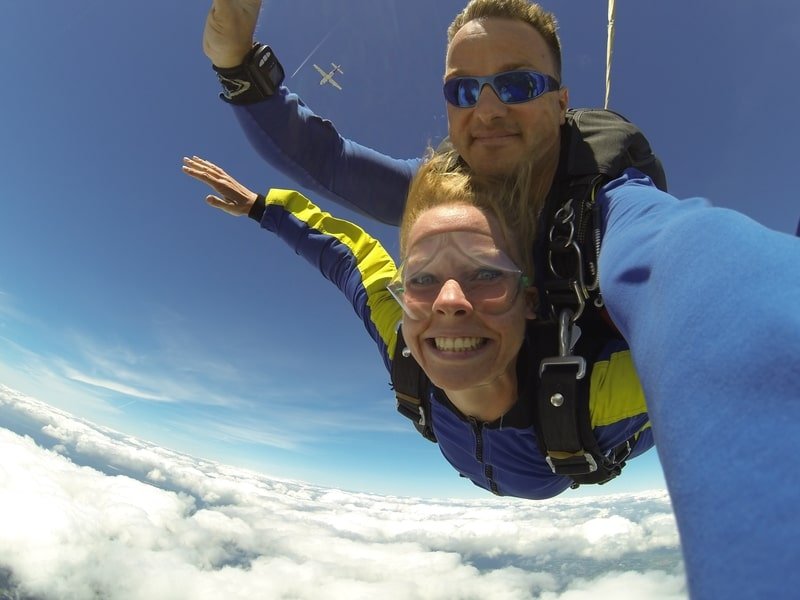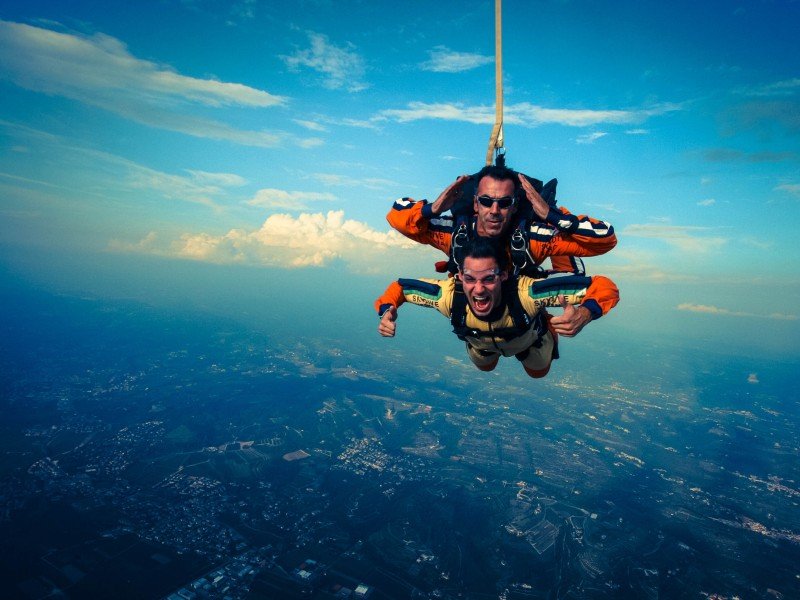So you’ve been buzzing with anxiety and excitement awaiting your next skydiving day. Only for the day to arrive and you feel a bit under the weather. You’re pretty sure it’s nothing serious, and although you don’t feel 100%. You are in good spirits and ready to take on the world. But can you go skydiving when sick?
Obviously, in light of Covid, you will want to take all the proper precautions and ensure you don’t have anything you can pass on. However, there are times when you feel a little snivel or a minor head cold. It’s not sick enough to make you take a day of work or stop doing any of your daily chores, but how do head colds affect skydiving?
Let’s go ahead and take a look at how being sick (even a little sick) can affect your skydiving experience. We can also look at what other disabilities and medical conditions you can and can’t skydive with.
Can you go skydiving while sick?

While skydiving is a fun and safe sport, it puts a lot of stress on you mentally and physically. You really want to feel 100% on the day of your skydive. You want to make sure it’s as fun and safe as can be. If you feel under the weather, any sickness can quickly increase with the anxiety and stress skydiving can cause.
You may have a little head cold that doesn’t affect you too much; however, a head cold can cause a lot of pain and problems at altitude. A fit and healthy person can regulate the increases and decreases in air pressure you experience when flying up in the jump plane and then rapidly dropping into freefall. However, any blockages or problems with your ears or sinuses can make it difficult for your body to deal with switches in air pressure. When your body cannot equalize the pressure, it pumps blood to your tissue to adjust the air. With your sinuses blocked and your body forcefully pumping blood to tissue, trying to balance the pressure, it can lead to a nasty headache or migraine. Such headaches make it hard to concentrate on what you are supposed to be doing. They also take away all the fun from a skydive.
If you are feeling clogged up, any mucus built around your sinuses can start to shift when you jump. If it makes its way into your inner ear, you are then at risk of infection. You are advised not to skydive if you feel sick, even if it’s a very mild cold. If you have any minor illness that doesn’t affect your balance, sinuses, or ability to function at 100%, we still advise speaking to your doctor before going skydiving.
What if you start to feel sick during your skydiving?

Again, it’s important to emphasize that you shouldn’t attempt to skydive if you feel under the weather. Even the smallest snivels, headaches, or sinus blockages can quickly increase and get out of control. As well as potentially suffering from a painful headache and the risk of a perforated eardrum, if your nose starts running during a skydive, it tends to go everywhere you don’t want it to (including over other people!).
But what if you feel OK in the morning but start to feel sick during the skydive?
As long as you were feeling OK before you boarded the plane, you should be fine. On the ride in the aircraft up to altitude, you may start to feel the pressure slowly changing. Mixed with the anticipation of the jump, you may feel a little strange and not your usual self. You will then feel a shift in pressure as soon as you jump, which can give you the feeling your ears and sinuses are blocked. This feeling is partly psychological but also very common. Any actual feelings of stuffiness or blocked-up ears should only be temporary.
If the stuffed-up feeling is bothering you, you can try to equalize the pressure yourself by pinching your nose, holding your mouth closed, and trying to push air out through your nose. You may hear a soft crackle. This sound is the tiny malleus, incus, and stapes bones in your ear trying to make way to allow pressure through. If it doesn’t work at first, you can try swallowing at the same time. These techniques should change the air pressure in your ears and sinuses and help bring your equilibrium back.
Can you go skydiving if you have asthma?
You can dive with asthma, and many asthmatic skydivers regularly jump without any problems or issues. Mild asthma generally won’t affect your ability to skydive, but with more severe cases, there could be issues. Here are the things to consider:
- You will not be able to use an inhaler while skydiving. It is also unlikely you will be able to use an inhaler during the plane journey or immediately after you land.
- You will be exposed to cold air and lower oxygen levels when at altitude.
- You may be exposed to pollen in the air at low altitudes and may even land in a field with a lot of pollen.
- If you are a steroid-dependent asthmatic, there is an increased risk of osteoporotic fractures during landing.
Skydiving should be a real possibility for most mild asthmatics or those who have the condition under control. But if you think the above could cause you issues, consult with your doctor to get their professional advice.
Can you skydive with a disability?

While skydiving while sick is a ‘no no’ (even with a mild cold), having a disability doesn’t need to stop you. Skydiving is a very welcoming sport, and many clubs and school accommodate as many needs and disabilities as they can.
We understand that every disability has its challenges and unique needs, but here are some disabilities and how it affects your ability to skydive:
Skydiving with disabilities
Deaf and hearing impaired: On a tandem skydive, you do not need to be able to hear to participate. There are some basic instructions and protocols your instructor will need to be able to communicate with you before the dive. But this disability shouldn’t be a significant obstacle. It can be a bit more complicated when learning to solo skydive, as you need to complete around 6 hours of classroom work. Some skydiving courses do offer signing interpreters who also have knowledge of the sport. Again, the disability itself won’t be a major issue during the jump, as long as you know what you are doing.
Blind and sight-impaired: Unfortunately, sight is critical for a solo skydive. Being able to see what is going on around you at all times is essential. Solo freefalling skydivers need 20/20 vision. However, it shouldn’t be an issue with regards to tandem skydiving. Instructions and safety procedures can be explained in advance, and most schools and instructors are more than happy to take blind or sight-impaired tandem students.
Paraplegic: Tandem skydiving is possible, although special equipment and extra time may be needed to complete the jump. Many skydiving schools and instructors cater to paraplegic students and will have the additional equipment required. With regards to solo skydiving, it is also possible, but you will need to find the right school. You may need additional training and will also need to have excellent upper body strength.
Quadriplegic: While solo skydiving would not be possible for a person with quadriplegia, some specialist skydiving centers have the equipment to cater to this disability and arrange a tandem skydive. You must consult with your doctor before taking on tandem skydiving with this condition.

